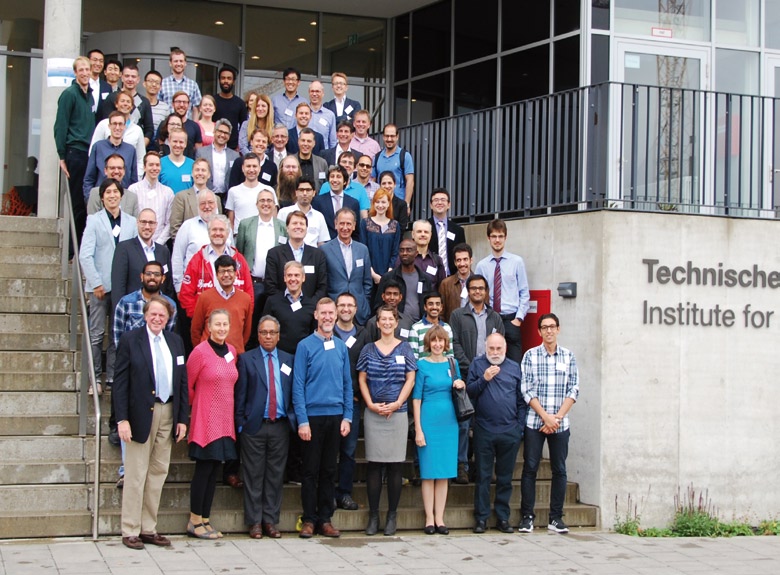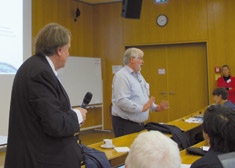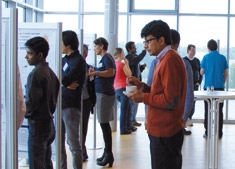International Symposium on Networked Cyber-Physical Systems (Net-CPS) at the Institute for Advanced Study at TU Munich
Cyber-physical systems (CPS) are technological systems where physical components and cyber components are tightly integrated. CPS have become ubiquitous. Inexpensive yet powerful devices can communicate, sense, and act in the environment; intelligent interfaces make interaction between humans and machines natural and rewarding; and the global communication and computing infrastructure is expanding its reach and increasing its power by the minute. This new environment is often referred to as a network-immersed world to emphasize that humans are now an integral part of the overall system. Networked CPS (Net-CPS) emphasize that while in CPS a key challenge is the modeling, performance evaluation and design of the tight integration of cyber and physical components, additional critical challenges emerge when such CPS operate in a networked setting. The challenges start even for defining and modeling what is meant by the abstraction “network” in these scenaria. Examples abound including interconnected and interacting sociotechnical systems, social networks over the Internet, heterogeneous energy systems, connected cars, smart transportation, collaborating robots, collaborating robots and humans and many others. Humans are an important component of such systems. This critical and emerging area has not received adequate attention by the research and development community. Leading scientists from the areas control, communication and computer science met at the International Symposium on Networked Cyber-Physical Systems (Net-CPS), organized by John Baras (Hans-Fischer Senior Fellow, Univ Maryland) and Sandra Hirche (TUM), to discuss the research challenges in this emerging and critical area. Internationally most renowned experts shared their views within the three plenary lectures, twelve invited lectures, two panel sessions, and two poster sessions of this Symposium. More than 90 researchers from Germany and abroad participated in the event, among them four PIs and multiple PhD candidates from the priority programme “Cyber-physical Networking”.
Important points of discussion were:
- Networked CPS have very wide and diverse application domains. The transportation, energy and manufacturing sectors are currently the most pushing domains.
- The scale and complexity of networked CPS grows continuously as inexpensive communication, computation and sensing becomes more and more available. Analysis and design methods have to measure up in scalability. The effect of the network and in its different possible meanings - be it the interaction, information sharing, or communication network - needs to be better understood.
- Due to the complexity, multi-physics, multi-time scale, and distributed nature of networked CPS the modeling poses a significant research challenge. Furthermore, the sources and thus the quality of models might be heterogeneous, which needs to be considered in analysis and design. Combination of model-based and data-based designs appears as one of the promising routes. Runtime calibration of models using data and run-time certification are further topics of high relevance.
- Safety, security, resilience, and privacy are important aspects of the design - in addition to performance. This often leads to contradictory design specifications, for example between performance and privacy, for which suitable trade-offs need to be found. Architectural principles for networked CPS are another open research challenge.
- Humans play a significant role in networked CPS. Humans interact with a networked CPS through interfaces, which need to be efficient and intuitive to use. Given the increasing autonomy of networked CPS, it is important to determine when human intervention is needed / desired. Humans further determine the quality metrics in many networked CPS application domains, e.g. in transportation and energy systems. Understanding human decision making, human-system interaction/cooperation, and human quality metrics is important. But also legal issues arising with increasing autonomy need to be considered, e.g. responsibility in case of failure.
- Education needs to change to address the new challenges raised by networked CPS and the key tole payed by humans. Emphasis on modeling and validation methods and tools should be incorporated in both undergraduate and graduate classes, as well as analytical methods combining calculus and logic mathematics. It is also extremely important to develop course providing hands-on projects with realistic networked CPS and human elements.



